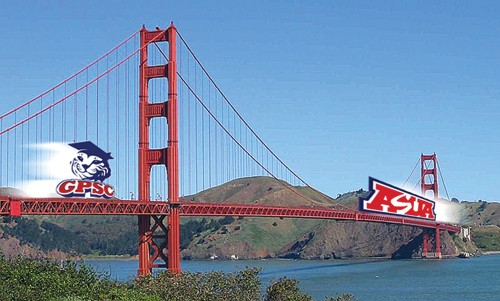The best way to maintain a good relationship is through excellent communication.
In what the Graduate and Professional Student Council President Dave Talenfeld has coined a “”bridgification”” phase, GPSC and Associated Students of the University of Arizona are using communication as their strongest point of entry into each other’s good graces.
“”The reason why communication is important is so that each organization understands what the other is doing on a consistent basis, so that we can exchange ideas, discuss things, and also so that we can support one another and help each other out,”” said ASUA President Chris Nagata, This move is not to remerge two organizations that were once one. Rather, it is to try to end a feud that has evolved over nearly two decades.
Three graduate students, Carlos Rodriguez, Javier Duran and Stephanie Wickstrom started what was then called the Graduate Student Council, in 1991 after branching away from ASUA.
Since then, there has been some animosity between the two groups.
In 2005, former ASUA President Cade Bernsen dismissed the GPSC as nothing more than a club.
Around the same time, then-GPSC President Elaine Ulrich told the Arizona Daily Wildcat that ASUA “”falsely claims”” to represent all UA students.
At the turn of the century, ex-ASUA President Ben Graff accused the GPSC of smearing his actions as the student body president and of “”stabbing (ASUA) in the back.””
Just last year GPSC pulled funds to send a bus full of students up to the state capitol because the GPSC president at the time, Stephen Bieda, wasn’t allowed to speak at the capitol alongside then-ASUA President Tommy Bruce, Talenfeld said.
The way to become allies is to forget the history of the two groups, Nagata said.
“”I think so much emphasis is placed on all the tension and all of the conflict that the two organizations have had in the past, and I think we really need to put that behind us,”” Nagata said. “”We need to work together and we really need to play off of each organization’s strengths.””
In an effort to end its historic feud, each organization has recently appointed liaisons to attend each other’s weekly meetings.
“”We’re trying to get ASUA to be more transparent and be more accountable for their actions, and we’re also trying to be more transparent, so it doesn’t look like anyone is trying to hide anything from anyone,”” said GPSC representative Lucy Blaney, who serves as the group’s liaison.
Blaney attended ASUA’s senate meeting last Wednesday, when ASUA voted to put its budget online. In the past, a public records request had to be submitted to view the budget.
GPSC’s budget is also going to be put online, Blaney said.
“”Everyone is showing their cards,”” she said.
One way GPSC showed support toward ASUA is by promising to contribute a nominal sum to ASUA to help fund certain graduate programs on campus, Talenfeld said, though he didn’t want to say how much.
“”There is a historical amount that has been contributed, and I’d like to see that amount at the very least maintained, if not increased,”” Talenfeld said.
Talenfeld and Nagata sometimes play pool together to discuss ways to replace former feelings between ASUA and GPSC with new ways to create a new bond.
“”The fact that we’re able to have a personal relationship with each other definitely makes working with each other professionally that much easier,”” Nagata said.
Adding ASUA involvement to GPSC’s student showcase, working on blood drives together and possibly hosting a joint event for a charitable cause are all ideas the two presidents have discussed, Talenfeld said.
There are some issues that the two groups share, Blaney said, and any kind of animosity between them is counterproductive.
“”My mission in this is to establish some amount of trust,”” Blaney said. “”We don’t have to be best friends, and we can definitely disagree on policy issues. That’s the whole point of student government. But if we don’t collaborate and talk to each other at all, I think we’re doing our constituents a disservice.””









